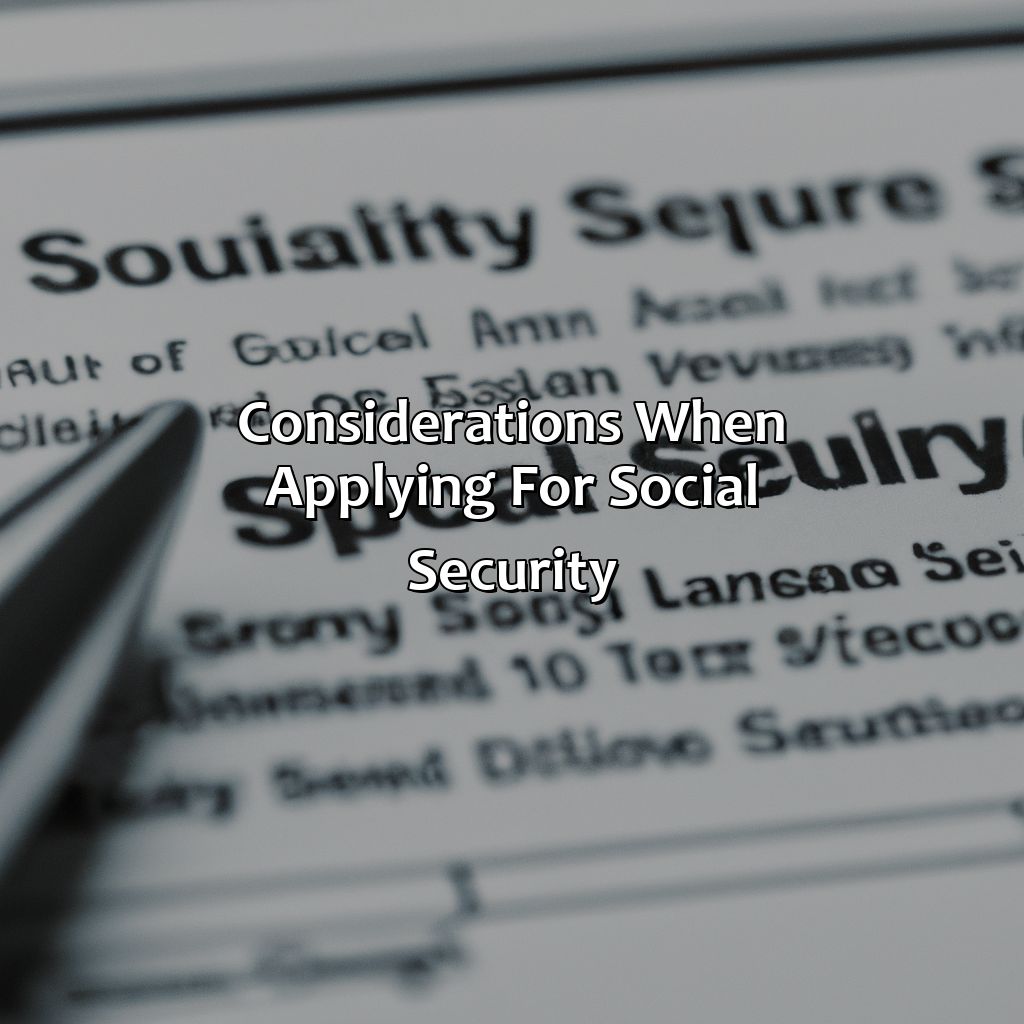How Soon Do I Need To Apply For Social Security?
Key Takeaway:
- Age requirements for social security benefits: The earliest age to apply for social security benefits is 62, but delaying your claim can result in higher monthly payments.
- How to apply for social security: There are three ways to apply for social security benefits, including online, in person, or over the phone.
- Considerations when applying for social security: Additional factors to consider when applying for social security benefits include spousal and survivor benefits, continuing to work while collecting benefits, and potential reductions in benefits based on your income and retirement age.
Are you worried about not knowing when to start your social security application? Don’t stress! You’ll learn the answers and have greater peace of mind with this helpful guide. We’ll discuss the best time to apply for social security benefits and other key considerations for a secure retirement. You’re one step closer to a secure future!
When Can You Apply for Social Security
Want to know when to get Social Security? Read our section ‘When Can You Apply for Social Security‘. It has 3 parts:
- Age Requirements for Social Security Benefits
- Exceptions to Age Requirements
- Benefits of Delaying Your Social Security Claim
Find answers and get insights!

Image credits: retiregenz.com by James Washington
Age Requirements for Social Security Benefits
Social Security benefits have a minimum retirement age requirement. To claim retirement benefits, applicants must meet the specified eligibility criteria. Additionally, there are provisions for early and delayed retirement benefits. Early retirement is available at 62 years with reduced benefit amounts while full retirement is attainable between the age brackets of 66 to 67 years old. Delayed retirement credits increase monthly benefits past full retirement age up to age 70.
In terms of disability, both physical and mental disabilities are covered by Social Security Disability Insurance (SSDI) for which there’s no specific age restriction as long as certain requirements are met. However, Supplemental Security Income (SSI) has an age component as it’s available only to elderly or disabled individuals aged 65 years or older.
Pro Tip: It’s ideal to wait until your Full Retirement Age (FRA) to claim Social Security benefits if possible. This is because filing before FRA results in reduced monthly payments while delaying further than FRA will result in an increase in earnings until the recipient reaches maximum payout at age 70.
For those who want to retire early and avoid age requirements, just remember: Social Security is not a get-rich-quick scheme, it’s a get-by-slower plan.
Exceptions to Age Requirements
Applying for Social Security benefits usually requires reaching a specific age. However, there are some alternative qualifiers that may allow for earlier application, known as Age Requirement Exceptions. One such scenario is being unable to work due to a medical condition expected to last at least one year or result in death. In these cases, benefits can be applied for as early as age 18.
Another consideration under Age Requirement Exceptions is if you are the surviving spouse of someone who earned enough Social Security credits and passed away while still working. In this instance, one can apply for survivor’s benefits beginning at age 60 (or 50 if disabled).
It’s important to note that those who have retired from their jobs before reaching full retirement age may also be able to receive benefits even though they aren’t technically supposed to until later on. It’s worth investigating whether or not collecting early will be more beneficial overall compared with holding out until full retirement age.
If you think you might qualify for an Age Requirement Exception, it’s best not to wait around too long before applying. The longer you put it off, the more time you’re waiving your benefits and missing out on potential monthly payments that could really help improve your standard of living in your golden years.
Delaying your social security claim may not make you immortal, but it might just make your retirement a little sweeter.
Benefits of Delaying Your Social Security Claim
Delaying Your Social Security Benefits Can Have Advantages
- Higher Monthly Income: If you delay your social security benefits, you will receive a higher monthly income after retirement. The longer you wait to claim it, the more money you will be eligible for.
- Inflation-Adjusted Payments: By delaying, your payments may increase based on inflation rates. Hence, it will keep up with the cost-of-living adjustment (COLA) and help you maintain purchasing power in future years.
- Maximum Benefit Credits: Delaying your benefits can give the maximum benefit credits for retirement which could further enhance lifetime earnings histories.
Delaying your social security insurance is one of the best strategies to improve financial health in the long term. While delaying your benefit may reduce spending in the current year; both expected and unexpected costs should be carefully evaluated before making this decision.
John had completed 62 and was facing difficulty meeting expenses required for his preferred lifestyle during retirement. However, instead of claiming social security benefits at 62 as many do to overcome immediate hardships, he waited until age 68 to begin collecting his full monthly benefit amount. John’s total payout increased substantially by doing so and helped him ease his post-retirement financial stress that had started building up at 62.
Ready, set, retire! Learn how to apply for Social Security and start counting down the days till bingo night.
How to Apply for Social Security
Apply for social security! There are multiple ways:
- Online is the easiest.
- But, if you like a personal meeting, do it in-person.
- Not comfortable with the internet? Phone it in – it’s the most convenient.

Image credits: retiregenz.com by Joel Washington
Applying for Social Security Online
When applying for Social Security benefits online, you can ensure a secured and straightforward process. Here’s how to get started.
- Create an account on the official Social Security website.
- Fill out your application following the prompts provided.
- Submit your application and wait for confirmation from Social Security.
It’s important to note that applying for Social Security benefits early can affect the amount of benefit payment you receive each month. Consider factors like your retirement plans and financial status before applying.
Pro Tip: Make sure to have all your personal information, including your Social Security number and employment history, ready before beginning the online application to save time and ensure accuracy.
Why wait in line for Social Security when you can apply for it in your pajamas? Save on the hassle and the laundry with online applications.
Applying for Social Security in Person
If you want to apply for Social Security in person, there are certain steps you need to follow. Here’s what you should keep in mind.
- Find the nearest Social Security office: Look up the location of the nearest Social Security office by using the Social Security Office Locator.
- Gather your documents: The documents needed can vary based on your specific situation, so it’s best to check the list on the official SSA website before visiting.
- Schedule an appointment: You can either call or visit the SSA website to schedule an appointment with an agent.
- Fill out the necessary forms: An SSA agent will provide you with a form that you need to fill out and submit.
- Wait for processing: Processing times may vary and typically take several weeks. You’ll receive a notification when your application has been processed.
- Check your application status: You can check the status of your application using your social security account on the SSN website or by calling their contact center.
Remember that applying for Social Security in person is just one way of applying. Other options include applying online or via phone.
It’s important to apply for Social Security as soon as possible because many benefits are time-sensitive and have deadlines. Don’t miss out on these benefits by delaying your application process. Take action now!
Who needs face-to-face interaction when you can apply for Social Security over the phone in your pajamas?
Applying for Social Security Over the Phone
When looking to apply for Social Security via phone, there are a few key steps you should follow. Dial the number provided on the official Social Security website and follow the voice prompts to speak with an agent. Provide them with all necessary identification and document information, such as your social security number and date of birth. Verification may also include confirmation of prior employment.
During your phone call, it’s important to listen closely to the questions being asked and provide accurate answers to ensure prompt processing of your application. After completing the call, be sure to take note of any additional information or documentation requirements that may have been provided.
It’s recommended that you apply for Social Security at least three months prior to when you anticipate needing funds. This can help prevent delays or complications in processing your application and receiving payments. Plan ahead and ensure you have all necessary documentation ready before making the call.
Remember, applying for Social Security over the phone may not be available in all circumstances or situations. In some cases, it may be necessary to visit a local Social Security office in person for assistance with filing an application or any other issues related to benefits enrollment.
To ensure maximum efficiency during your phone application process, consider preparing a list of questions ahead of time or seeking guidance from relevant publications associated with Social Security applications. By doing so, you’ll eliminate any roadblocks in advance so that everything goes smoothly during your application process.
Before you apply for Social Security, consider if you want to live like a retiree or a broke college student.
Considerations When Applying for Social Security
Maximize your Social Security benefits by considering a few factors first. Dig deeper into “Considerations When Applying for Social Security.” Take a look at “Spousal Benefits and Survivor Benefits,” “Working and Collecting Social Security Benefits,” and “Potential Reductions in Social Security Benefits.” These subsections could be the answer for a more secure financial future.

Image credits: retiregenz.com by David Jones
Spousal Benefits and Survivor Benefits
Spousal and Survivor Benefits are important considerations when applying for Social Security. Here are three key points to keep in mind:
- Spousal benefits can provide up to 50% of the higher-earning spouse’s benefit amount, but only if the lower-earning spouse claims at full retirement age or later.
- Survivor benefits can provide up to 100% of the deceased spouse’s benefit amount, but only if the surviving spouse waits until their own full retirement age to claim.
- In some cases, a divorced person may be eligible for spousal or survivor benefits based on their former spouse’s work record.
It’s worth noting that there are additional factors and rules surrounding spousal and survivor benefits that can affect eligibility and payout amounts.
One couple found themselves facing unexpected challenges when it came time to claim Social Security benefits after one spouse passed away. Despite having planned well for retirement, they had not fully understood how survivor benefits worked and were caught off guard by the reduction in income. Their financial advisor helped them navigate the system and they were ultimately able to receive their entitled benefits.
Just remember, work smarter, not harder – unless it’s to increase your Social Security benefits.
Working and Collecting Social Security Benefits
For those interested in both working and collecting social security benefits, there are some things to consider. You can collect Social Security as early as age 62, but if you choose to work while collecting benefits, your benefits may be reduced based on your income level. If you wait until Full Retirement Age (FRA) to collect Social Security, currently between the ages of 66-67 depending on your birth year, you won’t have a reduction in benefits no matter how much you earn.
In addition to understanding the impact of employment on your Social Security benefits, it’s important to know that if you begin claiming benefits before reaching FRA and continue to work, there is an earnings limit that may reduce your benefit amount. For example, in 2021 if you make more than $18,960 per year and are under FRA for the entire year, $1 will be withheld from your benefit for every $2 earned above this limit.
Pro Tip: Consider speaking with a financial planner or Social Security expert to help determine the best strategy for maximizing your Social Security benefits based on your individual situation and goals.
Why settle for a reduced social life when you can settle for a reduced social security benefit?
Potential Reductions in Social Security Benefits
When claiming Social Security, certain factors can potentially reduce benefits. There are reductions for early retirement as well as penalties for exceeding the earnings limit. Other possible reductions include government pension offset and windfall elimination provisions that may apply to those who receive pensions from non-covered employment or a spouse’s work record. It is crucial to consider these potential reductions and plan accordingly.
Moreover, it is essential to understand that making certain changes like starting a new job or moving can affect Social Security benefits. Receiving government benefits such as workers’ compensation or disability payments may also have an impact. Therefore, it is best to consult with a financial advisor and the Social Security Administration to make the most informed decisions about claiming benefits.
Additionally, it should be noted that while benefits can be reduced, they can also be increased by delaying retirement past full retirement age or waiting until age 70 to start collecting benefits. The decision to delay should factor in health status, other sources of income, and individual circumstances.
A woman named Sarah lost her husband unexpectedly and struggled financially while raising three kids on her own. She wasn’t aware that she was eligible for widow’s Social Security benefits until a friend suggested she look into it. By doing so, she was able to claim the money she deserved and receive continued payments until all her children were grown up. This story highlights the importance of researching available options when planning for Social Security benefits.
Five Facts About How Soon To Apply For Social Security:
You can apply for Social Security benefits as early as age 62, but your monthly benefit amount will be reduced. (Source: Social Security Administration)
If you delay your Social Security benefits until after your full retirement age, your monthly benefit amount will increase. (Source: AARP)
Your full retirement age is based on your date of birth and ranges between 66 and 67 years old. (Source: Social Security Administration)
You can continue to work and receive Social Security benefits, but if you earn over a certain amount, your benefits may be reduced. (Source: Social Security Administration)
The earliest you can apply for Social Security retirement benefits is three months before you turn 62 years old. (Source: Social Security Administration)
FAQs about How Soon Do I Need To Apply For Social Security?
How soon do I need to apply for social security?
It is recommended that you apply for social security three months before you want your benefits to start. However, you can apply as early as age 62 or as late as age 70. Keep in mind that the earlier you apply, the lower your monthly benefit payments will be.
What happens if I delay applying for social security?
If you delay applying for social security, your monthly benefit payments will increase. You can delay applying up to age 70, and for each year you delay, your monthly benefit payment will increase by about 8%. This is called earning delayed retirement credits.
What happens if I apply for social security after age 70?
If you apply for social security after age 70, you will not receive any additional delayed retirement credits. However, you can still apply and receive your benefits.
Do I need to have earned a certain amount before I can apply for social security?
Yes, you need to have earned 40 credits, with a maximum of four credits per year, in order to be eligible for social security benefits. For 2021, you earn one credit for every $1,470 in earnings, and you need to earn at least $5,880 to earn four credits for the year.
Can I apply for social security if I am still working?
Yes, you can apply for social security while you are still working. However, if you have not reached full retirement age, your benefits may be reduced if you earn over a certain amount. For 2021, if you are under full retirement age for the entire year, your benefits will be reduced by $1 for every $2 you earn over $18,960.
What documents do I need to apply for social security?
You will need several documents to apply for social security including your social security number, birth certificate, W-2 forms or self-employment tax return, and proof of any military service. You can find a full list of required documents on the Social Security Administration website.
 Checkout this IRS Loophole
Checkout this IRS Loophole 
